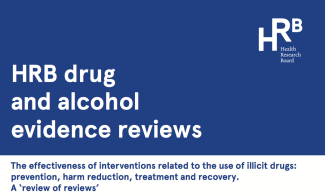The Effectiveness of Illegal Drug Interventions
Submitted by Ally
- 9 August 2017

This Health Research Board document reviews evidence on the effectiveness of interventions in the areas of prevention, harm reduction and long-term recovery from addiction to illegal drugs.
It asks which interventions are effective for:
- Reducing the up-take or continued use of illegal drugs and their related harmful behaviours among those below the age of 25?
- Reducing harmful behaviours related to the use of illegal drugs?
- Treating drug abuse among addicts?
- Supporting those who abuse illegal substances to recover fully and integrate back into society?
Below are the key conclusions reached:
Prevention:
- Structured, comprehensive school-based programmes that teach such skills as refusal, decision-making and coping, and which raise awareness of the social influences on drug use alongside more general information, may be effective for preventing substance abuse.
- School-based programmes that mainly focus on the risks of drug use appear to be ineffective for prevention.
- Family interventions, in which both parent and child participate, may be effective for preventing the use of cannabis.
- Programmes may be more effective when applied to a range of different domains – e.g. school, family, mentoring or media settings.
- Brief interventions in a school or healthcare setting appear to be ineffective.
Treatment:
- There is evidence to suggest that methadone and buprenorphine are effective for reducing the use of illegal opioids.
- Detoxification treatments (such as the above) are most effective when combined with structured psychological interventions.
- Naltrexone implants (as opposed to oral administration) may be effective for supporting continued abstinence among highly motivated individuals.
- Pharmacological treatments used with or without psychological invention may not be effective for treating dependency on stimulants such as cocaine or amphetamines.
- For the treatment of cannabis use, multidirectional family therapies appear to be more effective than psychological interventions among youth.
- Couples-based programmes, in which a non-drug dependent partner is involved, seem to be effective for cocaine addiction.
- Cognitive behavioural therapy (CBT) or motivational interviews may be more effective than no treatment. And yet, they are no more or less effective than other psychological approaches.
- Mindfulness may help to tackle drug use.
- There is no consistent evidence on the effectiveness of 12-step group participation programmes in residential settings.
- Peer coaching, recovery housing or mutual aid approaches may help to reduce drug use.
- Physical activity programmes may support abstinence.
- Acupuncture may enhance the effectiveness of pharmacological treatments for opioid addiction. However, it is not effective when delivered alone.
- Opioid substitution therapy may work in prison and community settings to reduce opioid dependency among those convicted of committing crimes.
- Therapeutic treatment in prison-based communities can help to reduce relapse of drug use and other criminal activity. Evidence on boot camps, drug courts and psychosocial interventions, on the other hand, was inconclusive.
- Slow-release morphine may be more effective than methadone treatments for heroin addiction among pregnant women.